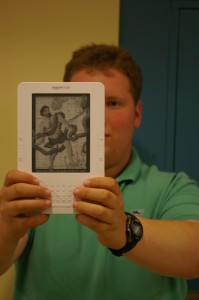
Reading a book a day can be an expensive habit. When Eric Wessan ’10 used to travel, he would have to load numerous books into a backpack, adding unnecessary weight to his journey. Thanks to Amazon’s Kindle, Wessan can now carry over 1500 books with him on a single 10-ounce device that is merely .36 inches thick.
Wessan, who purchased the latest generation of the Kindle at the end of this summer, has increased the rate of new books that he reads.
“It is much easier to carry around a Kindle than all these books,” Wessan said. “I am able to read whenever I feel like it.”
The ease of use of the Kindle is a high selling point among consumers. The device allows books, magazines and newspapers to be purchased and downloaded on a 3G wireless connection, the same type of connection that a cell phone runs on. However, this connection is free for all Kindle users. In addition to e-books, both fiction and non-fiction, the Kindle can download magazines and newspapers off of the 3G wireless connection.
For instance, Principal John Dodig, a Kindle user, wanted to purchase “Evolution of God” by Robert Wright, a book that the host of his favorite television show recommended to his audience.
“Normally I would go to Barnes & Noble and then to Amazon.com [to check out book prices],” Dodig said. “Now, I went to the Kindle website on my device and downloaded the book for $9.95 in 22 seconds.”
According to Dodig, the Kindle has doubled the amount of books that he reads as all of the Kindle e-books are cheap and easy to acquire.
Kindle e-books are cheaper than hard-cover or paperback books, as most new Kindle releases are priced at $9.95. In addition, the Kindle’s revolutionary “electronic ink” makes the Kindle’s screen resemble an actual page in a book rather than a computer screen.
“The print is very easy to read,” said English Department Chair Lis Comm. “You can read it at the beach and in the dark.”
While Comm loves the feel of holding a real book she also enjoys the Kindle for its conveniency and simplicity. Like Wessan, Comm would need to pack books in her luggage when she went on vacation. However, the Kindle allowed Comm to take all of the books that she wanted to bring with her on the trip.
The Kindle can also be utilized as a helpful reading tool. For example, Wessan downloaded the e-book “Heart of Darkness” by Joseph Conrad on his Kindle. Wessan explained that the only flaw to using the Kindle e-book in class was that the page numbers did not match up between his e-book and the print edition.
“If the teacher said to flip to a certain page, you would have to approximate where that is on your Kindle,” said Wessan.
The Kindle also allows the reader to use the built-in dictionary to look-up words that he/she may not know while reading.
“It’s good for academic study because you can make notes and underline text on the Kindle if you are reading a school book,” Comm said. “I hope that it inspires students to do more recreational reading.













































